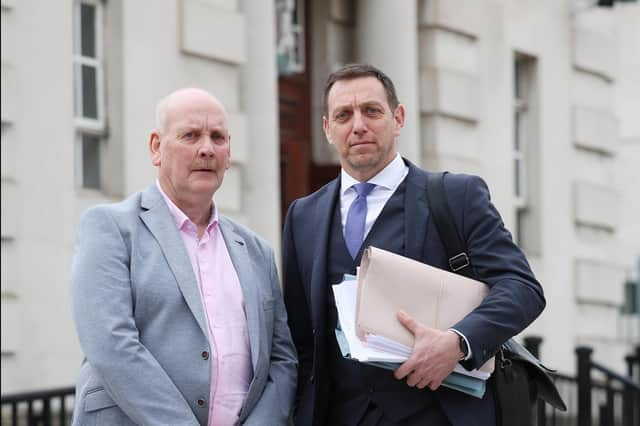Man jailed for murder of four soldiers in IRA bomb blast has his conviction quashed


Senior judges ruled that Patrick Thompson's murder convictions were unsafe due to confession evidence used against him at his Crown Court trial.
Major Peter Willis, 37, of the Green Howards, Sergeant Robert Samuel McCarter, 33, of the Royal Engineers, and Ammunition Technical Officers Calvert Brown, 25, and Edward Garside, 34, of the Royal Army Ordnance Corps, died in an IRA landmine explosion near Forkhill, south Armagh in July 1975.
Advertisement
Hide AdAdvertisement
Hide AdThe victims were part of a patrol investigating suspicious but ultimately decoy milk churns left near Ford’s Cross. A 70lb bomb planted in a beer keg concealed in a hedge was detonated by command wire, instantly killing all four.
Thompson was subsequently arrested driving a car as he matched a description given by another soldier. He denied any role in the attack, but was found guilty of the murders and IRA membership. He was handed life sentences of 30 years and was released from prison in March 1992.
Despite contending that RUC officers subjected him to degrading and inhuman treatment in custody to obtain the alleged confessions, an initial appeal against conviction was unsuccessful.
Now aged in his 70s, Thompson mounted a new bid to clear his name. The Criminal Case Review Commission (CCRC) referred Thompson’s case for fresh judicial consideration.
Advertisement
Hide AdAdvertisement
Hide AdThe CCRC cited "compelling evidence'' which called into question the credibility of a senior RUC detective who questioned Thompson during his arrest.
At his appeal hearing, defence counsel Frank O'Donoghue KC told Lady Justice Dame Siobhan Keegan, sitting with Lord Justice Treacy and Mr Justice Fowler, that Mr Thompson was wrongly convicted on the basis of his alleged confession to an “irredeemably tainted” senior detective.
He argued that the senior detective’s reliability as a truthful witness was assessed as “substantially weakened” because he was heavily criticised in a later court case where RUC officers were found to have rewritten interview notes and lied under oath.
Mr O'Donoghue also claimed police officers beat him into making false admissions. “The confessions were apparently like ‘It’s a fair cop gov’ where (the detective) comes in and says ‘this is all a load of nonsense’ and Mr Thompson immediately starts to make admissions,” the barrister submitted. “It’s highly unusual that someone would respond like that to a police prompt.”
Advertisement
Hide AdAdvertisement
Hide AdMr O’Donoghue argued that the same detective’s involvement in misconduct years later added to doubts about the safety of Thompson’s convictions.
“He was prepared to tell the court untruths in a convincing manner so that experienced judges believed he was an impressive witness - that strikes at the very heart of the integrity of the criminal justice system," he said.
Dealing with the alleged ill-treatment Thompson endured during police interviews, the barrister referred to incidents of being punched and kicked in the ribs.He was also forced to stand against a wall, made to do press-ups and subjected to verbal abuse, it was claimed.
According to Thompson’s account a plastic bag was put over his head for up to a minute and tied with a belt. Prosecution counsel Ciaran Murphy KC highlighted the lack of medical evidence of any physical injuries to Thompson.
Advertisement
Hide AdAdvertisement
Hide AdMr Murphy also said the findings of wrongdoing against the detective eight years later did not automatically undermine the safety of Thompson’s convictions.Based on the combined evidence, he described the case against Thompson as “overwhelming”.
Giving the judgement of the court today, Dame Siobhan said: "We have carefully considered all of the evidence and documents in order to reach our final view. It boils down to a very simple fact in that the detective inspector who took the confession was clearly not a man of truth or integrity.
"We are of the view that if the trial judge had been aware that the detective inspector had the potential to falsify a confession, as he was subsequently found to have done in another case eight years later, he may have been compelled to have ruled the confession inadmissible.